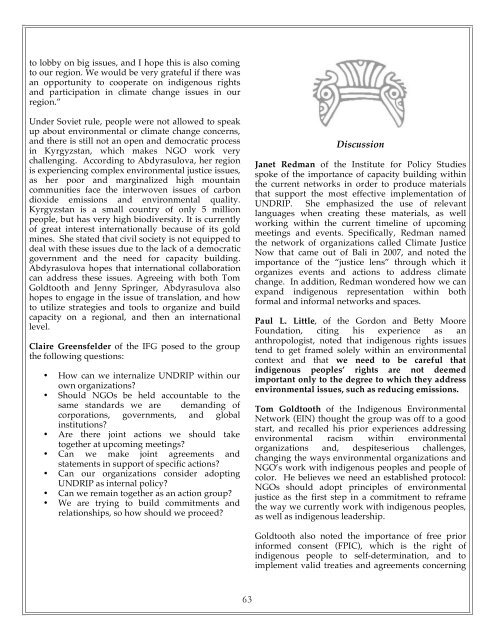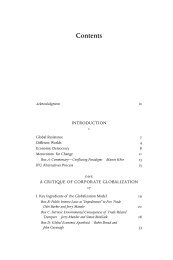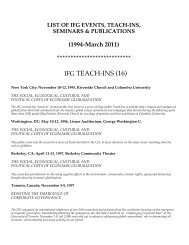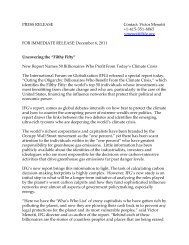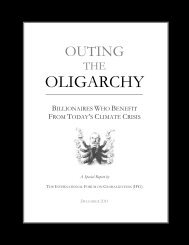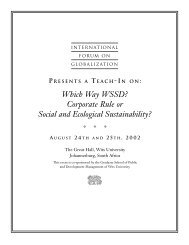UNDRIP Report - English FINAL - International Forum on Globalization
UNDRIP Report - English FINAL - International Forum on Globalization
UNDRIP Report - English FINAL - International Forum on Globalization
You also want an ePaper? Increase the reach of your titles
YUMPU automatically turns print PDFs into web optimized ePapers that Google loves.
to lobby <strong>on</strong> big issues, and I hope this is also coming<br />
to our regi<strong>on</strong>. We would be very grateful if there was<br />
an opportunity to cooperate <strong>on</strong> indigenous rights<br />
and participati<strong>on</strong> in climate change issues in our<br />
regi<strong>on</strong>.”<br />
Under Soviet rule, people were not allowed to speak<br />
up about envir<strong>on</strong>mental or climate change c<strong>on</strong>cerns,<br />
and there is still not an open and democratic process<br />
in Kyrgyzstan, which makes NGO work very<br />
challenging. According to Abdyrasulova, her regi<strong>on</strong><br />
is experiencing complex envir<strong>on</strong>mental justice issues,<br />
as her poor and marginalized high mountain<br />
communities face the interwoven issues of carb<strong>on</strong><br />
dioxide emissi<strong>on</strong>s and envir<strong>on</strong>mental quality.<br />
Kyrgyzstan is a small country of <strong>on</strong>ly 5 milli<strong>on</strong><br />
people, but has very high biodiversity. It is currently<br />
of great interest internati<strong>on</strong>ally because of its gold<br />
mines. She stated that civil society is not equipped to<br />
deal with these issues due to the lack of a democratic<br />
government and the need for capacity building.<br />
Abdyrasulova hopes that internati<strong>on</strong>al collaborati<strong>on</strong><br />
can address these issues. Agreeing with both Tom<br />
Goldtooth and Jenny Springer, Abdyrasulova also<br />
hopes to engage in the issue of translati<strong>on</strong>, and how<br />
to utilize strategies and tools to organize and build<br />
capacity <strong>on</strong> a regi<strong>on</strong>al, and then an internati<strong>on</strong>al<br />
level.<br />
Claire Greensfelder of the IFG posed to the group<br />
the following questi<strong>on</strong>s:<br />
• How can we internalize <str<strong>on</strong>g>UNDRIP</str<strong>on</strong>g> within our<br />
own organizati<strong>on</strong>s?<br />
• Should NGOs be held accountable to the<br />
same standards we are demanding of<br />
corporati<strong>on</strong>s, governments, and global<br />
instituti<strong>on</strong>s?<br />
• Are there joint acti<strong>on</strong>s we should take<br />
together at upcoming meetings?<br />
• Can we make joint agreements and<br />
statements in support of specific acti<strong>on</strong>s?<br />
• Can our organizati<strong>on</strong>s c<strong>on</strong>sider adopting<br />
<str<strong>on</strong>g>UNDRIP</str<strong>on</strong>g> as internal policy?<br />
• Can we remain together as an acti<strong>on</strong> group?<br />
• We are trying to build commitments and<br />
relati<strong>on</strong>ships, so how should we proceed?<br />
Discussi<strong>on</strong><br />
Janet Redman of the Institute for Policy Studies<br />
spoke of the importance of capacity building within<br />
the current networks in order to produce materials<br />
that support the most effective implementati<strong>on</strong> of<br />
<str<strong>on</strong>g>UNDRIP</str<strong>on</strong>g>. She emphasized the use of relevant<br />
languages when creating these materials, as well<br />
working within the current timeline of upcoming<br />
meetings and events. Specifically, Redman named<br />
the network of organizati<strong>on</strong>s called Climate Justice<br />
Now that came out of Bali in 2007, and noted the<br />
importance of the “justice lens” through which it<br />
organizes events and acti<strong>on</strong>s to address climate<br />
change. In additi<strong>on</strong>, Redman w<strong>on</strong>dered how we can<br />
expand indigenous representati<strong>on</strong> within both<br />
formal and informal networks and spaces.<br />
Paul L. Little, of the Gord<strong>on</strong> and Betty Moore<br />
Foundati<strong>on</strong>, citing his experience as an<br />
anthropologist, noted that indigenous rights issues<br />
tend to get framed solely within an envir<strong>on</strong>mental<br />
c<strong>on</strong>text and that we need to be careful that<br />
indigenous peoples’ rights are not deemed<br />
important <strong>on</strong>ly to the degree to which they address<br />
envir<strong>on</strong>mental issues, such as reducing emissi<strong>on</strong>s.<br />
Tom Goldtooth of the Indigenous Envir<strong>on</strong>mental<br />
Network (EIN) thought the group was off to a good<br />
start, and recalled his prior experiences addressing<br />
envir<strong>on</strong>mental racism within envir<strong>on</strong>mental<br />
organizati<strong>on</strong>s and, despiteserious challenges,<br />
changing the ways envir<strong>on</strong>mental organizati<strong>on</strong>s and<br />
NGO’s work with indigenous peoples and people of<br />
color. He believes we need an established protocol:<br />
NGOs should adopt principles of envir<strong>on</strong>mental<br />
justice as the first step in a commitment to reframe<br />
the way we currently work with indigenous peoples,<br />
as well as indigenous leadership.<br />
Goldtooth also noted the importance of free prior<br />
informed c<strong>on</strong>sent (FPIC), which is the right of<br />
indigenous people to self-determinati<strong>on</strong>, and to<br />
implement valid treaties and agreements c<strong>on</strong>cerning<br />
63


